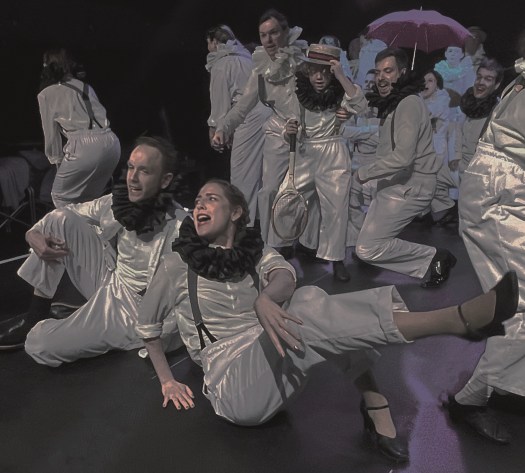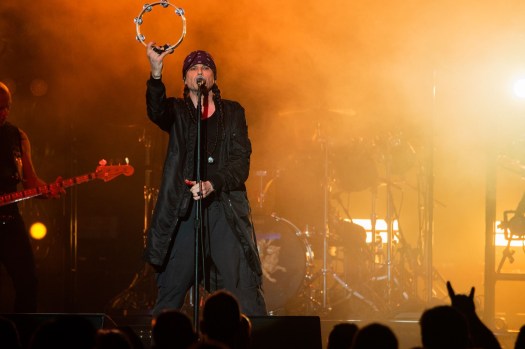
THE Sherman brothers’ fantasmagorical musical, Chitty Chitty Bang Bang, takes to the air at the Grand Opera House, York, from tonight.
Produced and directed by Nik Briggs, with musical direction by Adam Tomlison and choreography by Damien Poole, York Stage’s production of Ian Fleming’s story of madness, mayhem and magic features not only a big cast but a quartet of cars too.
“One of them is parked in the en-suite! That’s Baron Bomburst’s car, more of a vintage, turn-of-the-century car than Chitty, slightly more primitive, that we’ve brought here from Brighton,” says Nik. “The Baron wants inventor Caractacus Potts to fit it with a ‘float and fly’ features.
“There’s the battered old Chitty that the children find in a junkyard, and the Chitty with the title role, the 16ft long, 6ft wide, four-fendered Chitty, weighing 1,000kg, that magically flies over the Grand Opera House stage. We’ve hired that car from a company down south that built it specially for stage productions.
“We also have a smaller version of Chitty that was created for a production in Malton five or six years ago.”
Adapted from James Bond novelist Fleming’s story Chitty-Chitty-Bang-Bang: The Magical Car, written for his son in 1962 and published as three books in 1964, the musical tells the tale of whacky inventor Caractacus Potts (played by Ned Sproston), his two children and the gorgeous Truly Scrumptious (Carly Morton).
Can they outwit bombastic Baron Bomburst (Alex Papachristou), who has decreed that all children be banished from his kingdom? Watch out, here comes the evil Childcatcher (Richard Barker), who will be “popping up, here, there and everywhere, you never know where next”, Nik promises.

“Yes, we have the flying car, but at its heart, it’s a really lovely story of Caractacus and his children, who are so imaginative. Even though Chitty is burnt out when they find her, they see designs of the car and that leads them off into a fantasy world, where the Baron is desperate to have the car.
“His wife, the Baroness (Jackie Cox), will do anything to please him and so she sends spies Boris and Goran (Jack Hooper and James Robert Ball) – obviously not the most intelligent of spies – from Vulgaria to retrieve the car from England.
“We have a broad style of playing these characters, with various Germanic and Vulgarian accents rather than a uniform one,” says Nik. “We’ve deliberately allowed everyone to find the fun in their character, so they all have their different styles. It’s almost comedy in the ’Allo ’Allo! style.
“Traditionally you have a fall guy to set up the gag, but with the Baron and Baroness and the spies too, it’s more like being on a see-saw; they’re the fall guy for each other, so anything goes.”
Barlby-raised Alex Papachristou is returning to the York stage, where he first caught the eye, to take over the role of Baron Bomburst at short notice, heading up from London over the past fortnight for weekend rehearsals, to be followed by tech week.
“They’re ridiculous characters, like a parody of themselves, but it’s also good to see the consequences of the Baron and Baroness’s greed. He’s like a 1910 version of Donald Trump, saying he’s going to make Vulgaria great again!” he says.
“The villains do have a Bond villain quality about them. The Baron doesn’t have a cat but he does have a teddy bear.”

Nik adds: “The Jeremy Sams version of the musical that we’re using does feature the Baron and the Baroness and the two spies a lot more than the 1968 film, so you get the story of Caractacus Potts, his children and Truly Scrumptious, but more of the baddies too.
“It’s also interesting to have a story about a single father. Caractacus is this loving character who will do anything for his children, giving them their creative outlets and liberating them to do whatever they want. When the romance with Truly Scrumptious comes along, they are from two different worlds, but they find love.”
Alex’s Baron will differ from the screen version. “I don’t play him like in the film. I play him as a 33-year-old spoilt young Baron, not a baron in his sixties. Of the roles I’ve played before, he’s quite similar in that way to Herod [performed as a white-faced, cross-dressing vaudeville act in York Stage Musicals’ Jesus Christ Superstar in 2011, when Briggs was Pontius Pilate], but not similar to anyone else,” he says.
“I’ve had to work really hard at this role as he wasn’t a natural fit. I even had Brian Blessed in my head for a while! The humour is more dry, more subtle, than in the film, and these characters are so well written that there’s a lot of elasticity to play around with them: you could really do it 100 ways, but as long as the children in the audience hate you and the adults love you, that’s all that matters!
“On the surface, the Baron and Baroness love each other, but underneath, they can’t stand each other, and it’s good to play someone who has more than one level to their character. These are the parts that are a joy to do and it’s always fun to be the villain.”
York Stage in Chitty Chitty Bang Bang, Grand Opera House, York, today to April 15, 7.30pm nightly except April 9, plus 2.30pm matinees, tomorrow, Saturday, April 12 and 15. Box office: atgtickets.com/york.
Copyright of The Press, York


































